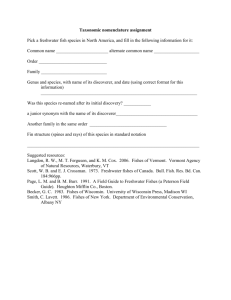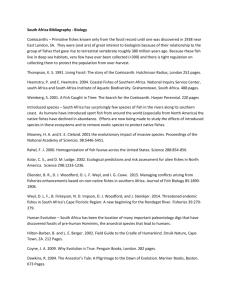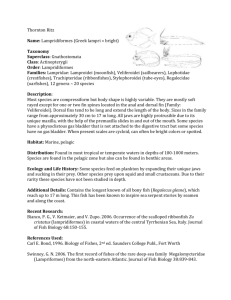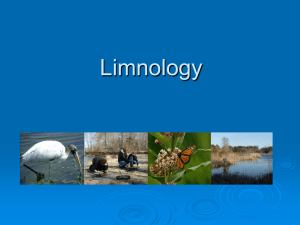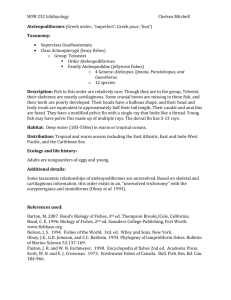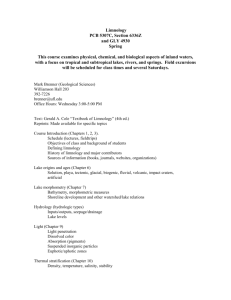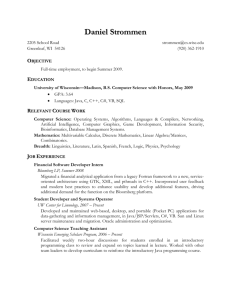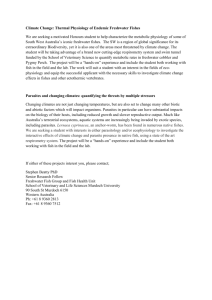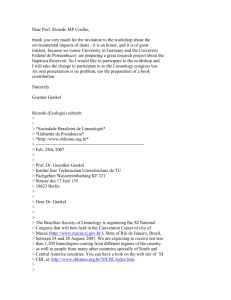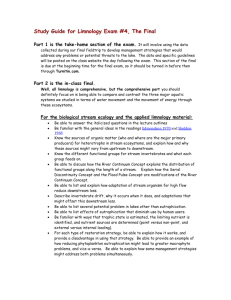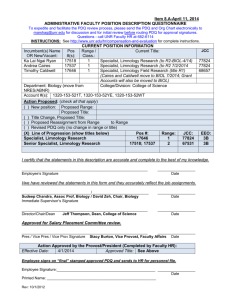ZOO 511 - Center for Limnology
advertisement
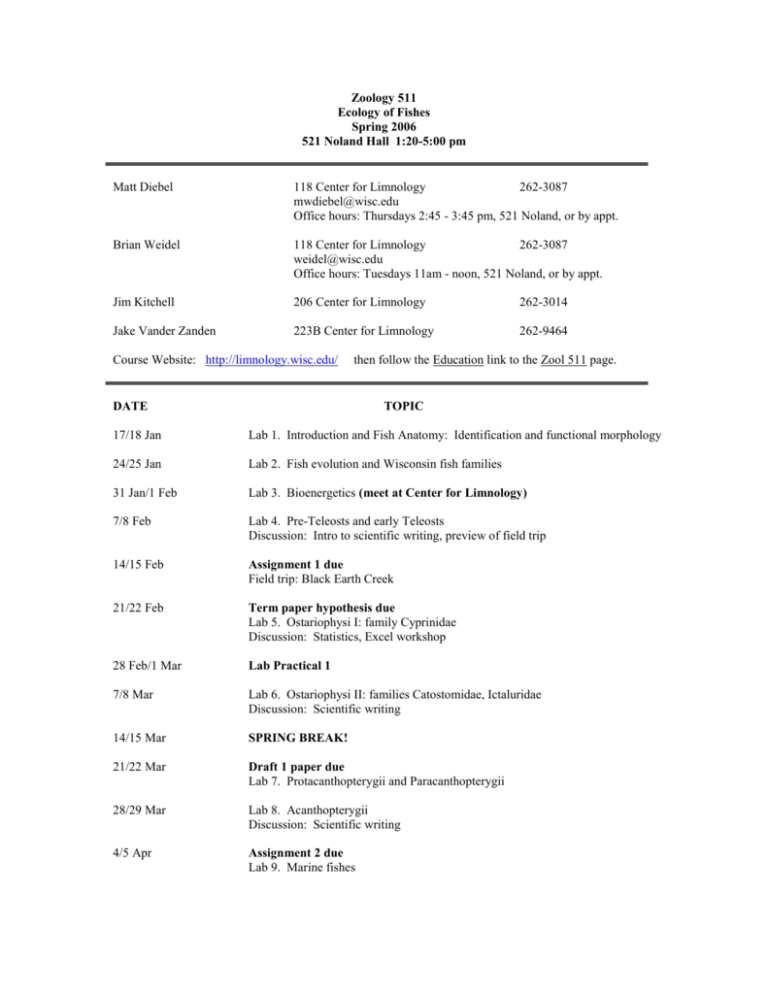
Zoology 511 Ecology of Fishes Spring 2006 521 Noland Hall 1:20-5:00 pm Matt Diebel 118 Center for Limnology 262-3087 mwdiebel@wisc.edu Office hours: Thursdays 2:45 - 3:45 pm, 521 Noland, or by appt. Brian Weidel 118 Center for Limnology 262-3087 weidel@wisc.edu Office hours: Tuesdays 11am - noon, 521 Noland, or by appt. Jim Kitchell 206 Center for Limnology 262-3014 Jake Vander Zanden 223B Center for Limnology 262-9464 Course Website: http://limnology.wisc.edu/ then follow the Education link to the Zool 511 page. DATE TOPIC 17/18 Jan Lab 1. Introduction and Fish Anatomy: Identification and functional morphology 24/25 Jan Lab 2. Fish evolution and Wisconsin fish families 31 Jan/1 Feb Lab 3. Bioenergetics (meet at Center for Limnology) 7/8 Feb Lab 4. Pre-Teleosts and early Teleosts Discussion: Intro to scientific writing, preview of field trip 14/15 Feb Assignment 1 due Field trip: Black Earth Creek 21/22 Feb Term paper hypothesis due Lab 5. Ostariophysi I: family Cyprinidae Discussion: Statistics, Excel workshop 28 Feb/1 Mar Lab Practical 1 7/8 Mar Lab 6. Ostariophysi II: families Catostomidae, Ictaluridae Discussion: Scientific writing 14/15 Mar SPRING BREAK! 21/22 Mar Draft 1 paper due Lab 7. Protacanthopterygii and Paracanthopterygii 28/29 Mar Lab 8. Acanthopterygii Discussion: Scientific writing 4/5 Apr Assignment 2 due Lab 9. Marine fishes 11/12 Apr Field trip: Wisconsin River watershed (meet at Center for Limnology) 18/19 Apr Draft 2 paper due Field trip: Lake Mendota (meet at Center for Limnology) 25/16 Apr Review for Lab Practical #2 2/3 May Lab Practical 2 Goals – during this class you should: Acquire a basic understanding of the evolutionary trends of fishes. Be able to identify selected fish species found in Wisconsin. Acquire skills to conduct and analyze scientific experiments and to write a scientific paper. Acquire an appreciation of the diversity of fishes, fish anatomy, and adaptations to diverse life histories. Field Trips are scheduled for the normal lab period (1:20-5 pm). Students must attend on their regular lab day. Remember to dress appropriately for the conditions. Term Paper This course emphasizes writing more than most science courses you may have taken. Class exercises will explore the art of scientific writing. You will write two drafts of a scientific paper, which will be reviewed by the T.A. and by your peers. Anticipate spending a significant amount of time on this paper. Exams There will be two in-class exams. Exams will be based on fish identification, lectures, readings, and discussion. Exam format will be short-answer or fill-in-the blank in a lab practical format. Questions Most weeks, you will turn in short answers to questions, based on the previous week’s lab. Please pay attention to these short questions each week. Although they are only worth a few points each week, they can make the difference between letter grades. Other assignments Assignment 1: A self-designed key to the fish families of Wisconsin. Assignment 2: A peer review of another student’s draft 1 paper. Grading scale Your grade will be based on exam scores, the term paper, weekly questions, assignments, and class participation. Point breakdown is as follows: In-Class Exams (40 pts each) Paper (Total) Hypothesis First Draft Second Draft Assignments (15 pts each) Questions (3 pts each week) Total points: 80 60 10 20 30 30 30 200 All assignments are expected to be turned in on their due date. Assignments can be turned in during lab or placed in Matt or Brian’s mailbox at the Center for Limnology, 680 N. Park St., just inside the main entrance. For every day that an assignment is late, we will take off 10% of the maximum attainable score. Final grade cutoffs: Grade A AB B BC C D Incomplete Points 186 176 160 150 136 118 <118 Percentage 93 88 80 75 68 59 <59 Readings Readings will be placed on reserve at the Biology Library (Birge Hall) under ZOO 511. These books can also be viewed in the Limnology library. You will be informed of additional readings as needed during the semester. Becker, G.C. 1983. The Fishes of Wisconsin. University of Wisconsin Press. Madison, WI. Available online at: http://www.seagrant.wisc.edu/greatlakesfish/becker.html Evans, D.H. (Ed.). 1993. The Physiology of Fishes. CRC Press. London. Helfman, G.S., B.B. Collette, and D.E. Facey. 1997. The Diversity of Fishes. Blackwell Science, Inc. Malden, MA. Matthews, W.J. 1998. Patterns in Freshwater Fish Ecology. Chapman & Hall. New York, NY. Moyle, P.B., and J.J. Cech. 1996. Fishes: An introduction to Ichthyology. Prentice Hall. Saddle River, NJ. Wooton, R.J. 1990 Ecology of Teleost Fishes. Chapman and Hall. London.
